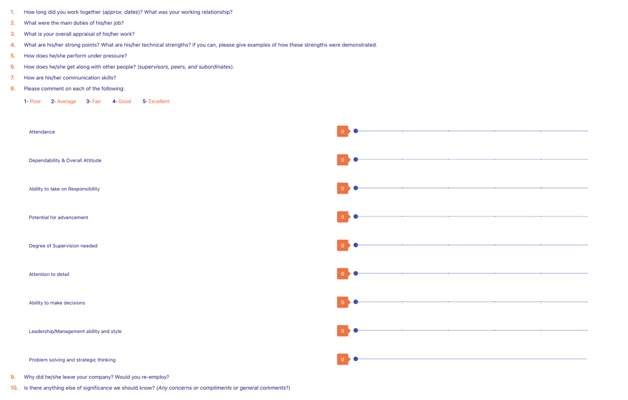“If you think it’s expensive to hire a professional, wait until you hire an amateur.” – Red Adair, American Oil Well Firefighter
Let’s paint a quick picture: you have found a potentially promising candidate for the open position in your company. All the interview processes and testing seems to have gone well. The only thing left to do now is checking the references. As an employer, you know that resumes, no matter how promising they may look, can always be tailored and polished. Interviews can always be prepared for as well. In such scenarios, it is often reference checks that act as the tie-breaker. Reference checks can be powerful tools to help you not only verify the information the candidate gave you, but also understand them on a deeper level.
If it is done well, it can save you time and money. If not, it can have quite the opposite effect and cost you precious time and resources. Hence, in this blog, we want to walk you through an ideal way to go about the reference checking process so that you can make the most out of it. This brings us to the first question: What is the ideal way to go about the reference checking process?
Table of Contents
ToggleWhat Is an Ideal Reference Check?
Before we talk about best practices, we need to establish what is an ideal reference checking process from the employer’s perspective. As an employer, you are looking for a minimum of two professional references that can help you get a better understanding of the candidate as well as verify the information you may have picked up during the interview process.
You are also ideally looking to get in touch with references who have a high level of credibility within their respective industries. This ensures that the information they give you carries weight and allows you to make an informed decision about who you bring onto your team.
With that in mind, it would be preferable to talk to the candidate’s former supervisors or seniors who can attest to the candidate’s potential. If the applicant is hesitant to list references from their immediate or current position, then ask for someone at their previous company. Once you have the candidate’s consent for the reference check, contact each reference and then the process can begin.

A sample to give you an overview idea of the template with the reference checking process.
A Template for the Ideal Reference Checking Process
Before beginning any reference checking process, you need to have those questions ready. It has to be the right combination of factual and in-depth questions that will give you insight into the character of the candidate as well as their professional fit for the role. This means that there are certain questions that you can ask, but also ones you should not ask.
If you are doing a reference check as an employer for the first time, then you will want to follow this template:
- Start by verifying the candidate’s name and their professional connection to the referee in question.
- Describe the position the candidate applied for and probe about what makes them a good fit.
- Probe about how they got along with the rest of the team.
- Have the referee rank the candidate on a scale of 1 to 10.
- Ask about their skills, strengths, weaknesses and behaviour.
Here are some examples of questions that you can ask to get to the answers you need:
- How do you know the candidate and for how long?
- Do you think they would make a good fit for this role at our company?
- What was it like to supervise them?
- How would you rate their overall performance on the job?
- What would you say are some of the candidate’s most prominent strengths?
- How well did they function with the rest of your team during their time at the company?
- Is there anything more I should know about the candidate?
Here are some topics that you should absolutely not ask about during the reference checking process:
- Age, race, religion, gender, sexual orientation, disabilities or health status.
- Criminal history
- Credit and salary
- Marital Status, family or children
- Nationality
Keep in mind, these pointers are just to help you get a basic idea of an ideal reference checking template that you can implement. For a more detailed template of questions to ask you should consider checking out our recommended reference checking template for you to follow. It will help you ask all the right questions and take a huge weight off your shoulders.
"People are not your most important asset. The right people are."
- Jim Collins, Author of Good to Great
How Do You Validate the Information from Reference Checks?
At the end of the day, reference checks are based on human responses, no matter how factual they may be. So, how do you know that the information that you get is reliable? Well, there are a few ways you can go about it, which centre around appealing to human nature and a little bit of clever strategy. Keep in mind that this is the most crucial part of the reference checking process.
- More often than not, referees might be hesitant to give you all the information due to fears of potential liabilities. What you can do is have the candidate sign a waiver of consent, which you can then show to the referee so that they are protected (within reason of course).
- Choose your own references and vet them thoroughly. We aren’t saying you should go behind the candidate’s back and choose the references they never consented to. Obviously candidates will filter out references that will help their cause. To keep the information as valid and credible as possible, ask the candidate who their boss was.
Ask about supervisors and seniors they might not have listed and follow up with them. Obviously you will need to do due diligence and verify that these people are who the candidate claims to be. Calling up the company’s HR to verify the referee’s credentials and even looking them up on platforms like LinkedIn can go a long way. - Gather a wider set of data by talking to as many references as possible. Generally the rule of thumb is checking at least two references. But hey, the more the merrier. It will give you a wider pool of information to compare and verify.
- Ask targeted and specific questions about things you would have observed during the interview process with the candidate. Maybe they told you that they worked on a big project with a certain person. Confirm if that is the case and if you could see some of the results of said project.
There is a fine line between asking too many questions and asking too little with reference checking.

Conclusion
At the end of the day, it doesn’t matter how perfect your template is if you don’t balance between asking the right questions and asking too many questions. The fact is you run the risk of asking way too many questions which can cause the referee to withdraw from the conversation. On the other hand, if you ask too little, you may never get the answers you need to make an informed decision. That is why it is so important to ask the right questions within a limited space.
That’s one of the problems that we here at Credibled are aiming to help overcome in the industry with our efficient automated reference checking process. For more information, check out our website!




